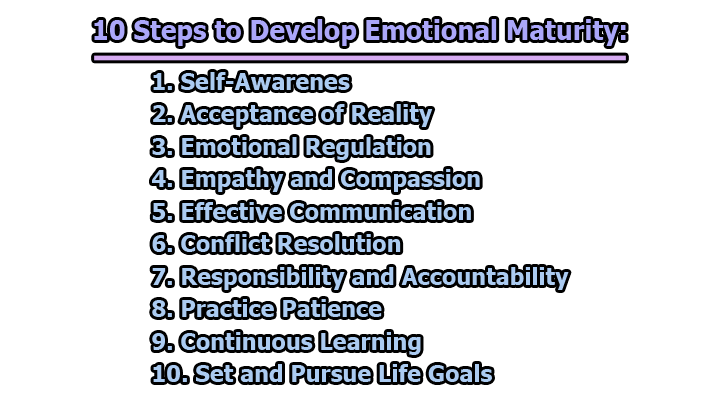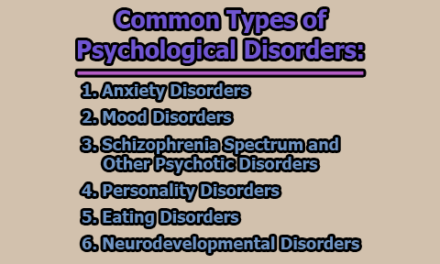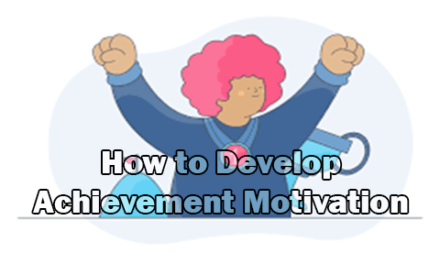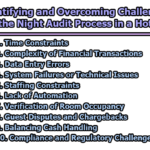10 Steps to Develop Emotional Maturity:
Emotional maturity is a cornerstone of personal development, empowering individuals to navigate life’s complexities with resilience and grace. Cultivating emotional maturity is a transformative process that requires self-reflection, dedication, and a commitment to growth. In this article, we explore 10 steps to develop emotional maturity.
1. Self-Awareness (The Foundation of Emotional Maturity): Self-awareness is the cornerstone of emotional maturity. Begin by engaging in introspection to understand your emotions, triggers, and behavioral patterns. Reflect on your strengths and weaknesses, acknowledging both the positive and challenging aspects of your personality. This deep self-awareness forms the foundation for effective emotional regulation and paves the way for personal growth.
To enhance self-awareness, consider keeping a journal to track your emotions, reactions, and the circumstances triggering them. Regularly revisit and analyze your entries to identify recurring patterns, facilitating a deeper understanding of your emotional landscape.
2. Acceptance of Reality (Navigating Life’s Uncertainties): Embracing the reality that life is inherently unpredictable is a crucial step toward emotional maturity. Understand that not everything will go according to plan, and uncertainties are an inherent part of the human experience. This acceptance empowers you to approach challenges with a composed mindset, reducing stress and fostering inner peace.
Practice mindfulness techniques to stay present in the moment. Mindfulness encourages acceptance by grounding you in the reality of the present rather than dwelling on past regrets or future anxieties. By acknowledging and accepting life’s uncertainties, you open the door to emotional resilience and a more balanced approach to adversity.
3. Emotional Regulation (Mastering the Art of Self-Control): Effective emotional regulation is a skill that distinguishes emotionally mature individuals. Practice mindfulness meditation and deep-breathing exercises to stay attuned to your emotions without being overwhelmed by them. The ability to respond thoughtfully, rather than react impulsively, is vital for maintaining healthy relationships and managing stress.
Develop a toolkit of strategies for emotional regulation, including techniques such as taking short breaks during stressful situations, engaging in physical exercise, or redirecting negative thoughts. Consistent practice of these strategies empowers you to navigate emotional challenges with composure and clarity.
4. Empathy and Compassion (Building Stronger Connections): Cultivating empathy is a key component of emotional maturity. Put yourself in others’ shoes, seeking to understand their perspectives and emotions. This empathetic approach fosters compassionate interactions, building stronger and more meaningful connections with those around you.
Practice active listening to genuinely understand others’ experiences and emotions. Acknowledge and validate their feelings, demonstrating genuine concern and support. By incorporating empathy into your interactions, you contribute to a more positive and harmonious social environment, promoting emotional growth for yourself and those you engage with.
5. Effective Communication (Articulating Thoughts and Feelings): Effective communication is a skill that significantly contributes to emotional maturity. Learn to articulate your thoughts and feelings with clarity and openness, avoiding aggressive or defensive communication styles. Expressing yourself effectively fosters understanding in relationships and minimizes misunderstandings.
Practice “I” statements to express your feelings without assigning blame. For example, say, “I feel overwhelmed when there’s a lack of communication,” instead of placing blame with statements like, “You never communicate with me.” This shift in communication style encourages open dialogue and creates a foundation for healthier connections.
6. Conflict Resolution (Navigating Disagreements with Grace): Developing emotional maturity involves learning to navigate conflicts with a constructive mindset. Instead of avoiding disagreements, approach them as opportunities for growth and understanding. Cultivate the ability to address conflicts calmly and with a solution-oriented approach. Seek compromise and resolution, understanding that disagreements are a natural part of any relationship.
Practice active listening during conflicts, ensuring that you understand the other person’s perspective before expressing your own. Focus on finding common ground and mutually beneficial solutions rather than escalating the disagreement. The ability to navigate conflicts with grace contributes to healthier relationships and reinforces emotional maturity.
7. Responsibility and Accountability (Owning Your Actions): Taking responsibility for your actions is a pivotal step toward emotional maturity. Acknowledge mistakes without deflecting blame, and use them as opportunities for learning and growth. Accepting accountability fosters a sense of personal responsibility, empowering you to make more intentional and thoughtful decisions.
Reflect on past actions and consider how they align with your values and goals. When faced with challenges, resist the urge to blame external factors and instead focus on what you can control. Embracing responsibility and accountability builds character and contributes to a strong foundation for emotional maturity.
8. Practice Patience (Enduring Life’s Challenges): Cultivate patience as an essential component of emotional maturity. Understand that personal growth is a gradual process, and challenges are inevitable on life’s journey. Developing the ability to patiently endure difficulties contributes to emotional resilience and a more positive outlook.
Practice mindfulness in moments of frustration or impatience. Focus on the present, and remind yourself that difficulties are temporary. Consider the bigger picture and recognize that personal and emotional growth often requires time and persistence. Patience becomes a valuable tool in navigating life’s ups and downs with a calm and collected demeanor.
9. Continuous Learning (A Commitment to Growth): Commit to lifelong learning as a means of fostering emotional maturity. Stay curious and open-minded, actively seeking opportunities for personal and professional development. Embrace new perspectives, knowledge, and experiences, applying them to enhance your understanding of yourself and the world.
Engage in activities that challenge your intellect and broaden your horizons. Attend workshops, read diverse literature, or pursue new skills and hobbies. The commitment to continuous learning keeps your mind agile, encourages adaptability, and contributes to personal growth on the path to emotional maturity.
10. Set and Pursue Life Goals (A Roadmap for Emotional Fulfillment): Establishing clear life goals is the final step toward emotional maturity. Define what matters most to you and create a roadmap for achieving these aspirations. Having a sense of purpose provides direction and motivation, shaping your decisions and actions.
Break down larger goals into smaller, manageable steps, and celebrate achievements along the way. Persistence and hard work become integral to pursuing meaningful objectives. A clear vision acts as a guiding force, helping you make choices that align with your values and contribute to emotional fulfillment.
In conclusion, developing emotional maturity is a lifelong journey that involves self-awareness, acceptance, and continuous growth. By following above steps, individuals can cultivate emotional resilience, healthier relationships, and a more fulfilling life. Embracing emotional maturity not only enhances personal well-being but also positively impacts the overall quality of life and interactions with others.

Former Student at Rajshahi University










